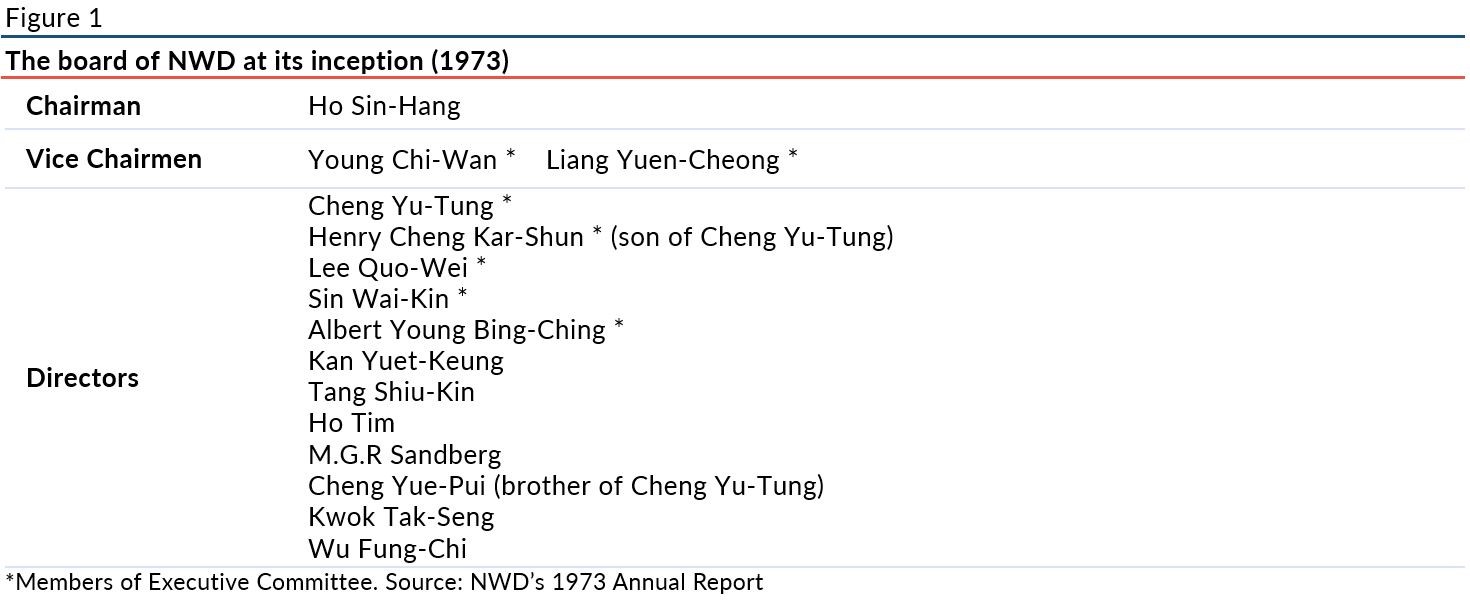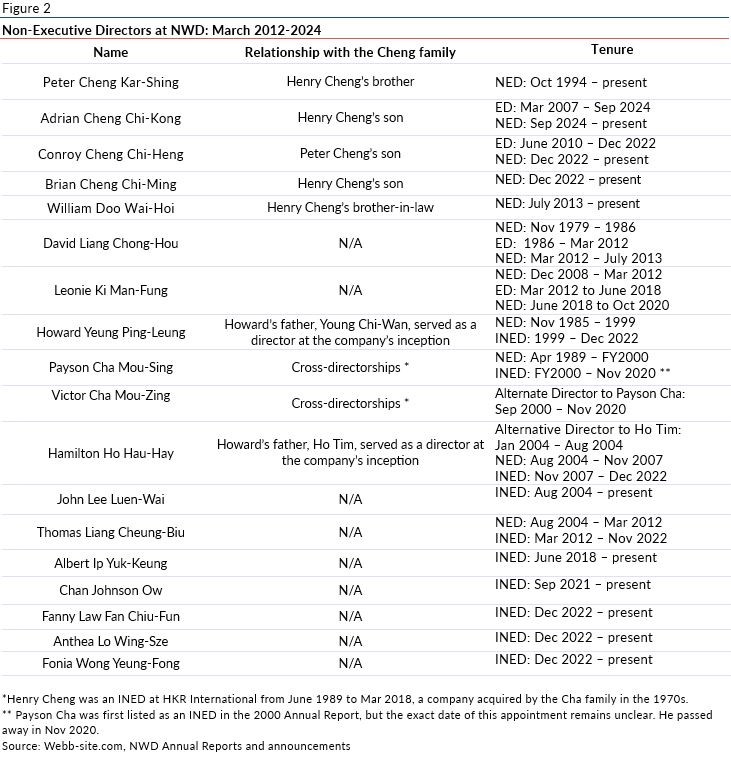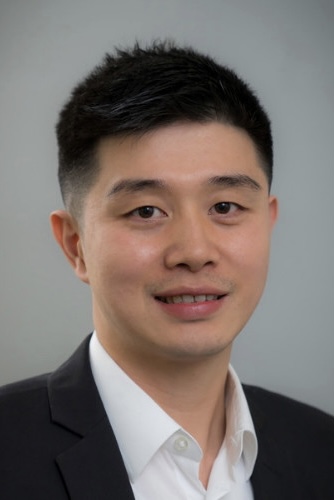New World Development’s (NWD) recent financial woes have made headlines: FY2024 saw a net loss of HK$19.6bn (US$2.5bn) and its share price has collapsed from HK$40 level in 2020 to as low as HK$4 before a recent bounce. Some US$10bn or more than 85% of its market value has been wiped out, leaving it with a market capitalisation currently of around US$1.7bn. The challenges have been largely attributed to its heavy reliance on mainland China and aggressive borrowing: consolidated debt increased by about HK$15bn (US$1.9bn) over FY2019 to FY2024, taking the gearing ratio from 51% to 92%. The company’s last reported consolidated net debt as at the end of December 2024 was HK$124.6bn (US$16.1bn), about 9x of its market capitalisation at the time of writing of approximately HK$13.5bn.
The CEO, Adrian Cheng – son of the chairman, Henry Cheng – who had been at the helm since May 2020 resigned in September 2024. He was succeeded by the former COO, Eric Ma. Apparently to pursue personal commitments, Ma abruptly resigned within two months. NWD is now on its third CEO, Echo Huang, within a space of just a few months. Yet serious governance issues have largely flown under the radar. This analysis examines at the company’s board independence, focusing on the roles of non-executive directors (NEDs) as well as the nomination and audit committees.
While not exhaustive of the concerns, we find a web of family ties and business connections that appear to have undermined board effectiveness. The Audit Committee (AC) was made up of supposedly independent directors (INEDs) with multiple corporate and public service roles but also with deep-rooted ties with the Cheng family. The Nomination Committee (NC), meanwhile, has been chaired by the board chairman Henry Cheng since its inception in 2012. Nearly all recently appointed non-executive directors (excluding INEDs) are members of the Cheng family, raising serious concerns over their independence and oversight – as well as responsibility for the turmoil and value implosion at NWD.
A legacy of family control
Founded in May 1970, NWD went public on the Hong Kong Exchange (HKEX) in October 1972. Its 1973 annual report reveals a board composed of Hong Kong’s business elite, alongside the son and brother of the co-founder, Cheng Yu-Tung

While there were no functional board committees as these were not required at the time, however, NWD did establish an Executive Committee (EC) from the outset. As of FY1973, this committee comprised seven members, including Cheng Yu-Tung and his son, Henry Cheng.
The company’s governance structure has evolved over the decades, with five functional committees now in place. The EC, described as “the chief operating decision-maker,” has consistently been composed of executive directors (EDs). Henry Cheng has chaired the EC since March 2012, even during the tenure of his son, Adrian Cheng, as CEO. He simultaneously served as both the board chair and NC chair since 2012.
NEDs: a largely family affair
NEDs are expected to act as a counterbalance to executive power, bring independent judgement to board meetings and scrutinise the company’s performance, as outlined in the HKEX CG code. NWD itself has long acknowledged the role of NEDs as a source of independent judgement, stating in its 2006 annual report:
“Non-executive Directors (including the Independent Non-executive Directors) serve the relevant function of bringing independent judgement on the development, performance and risk management of the Group.”
Nicely said. However, as Figure 2 demonstrates, since March 2012, all but two of the NEDs (excluding INEDs) have been members of the Cheng family. The two non-family members, David Liang and Leonie Ki, had served as EDs, with total association spanning over 11 years and 33 years, respectively.
Additionally, there was no significant refreshment of INEDs until the end of 2022. When they stepped down in December that year, Hamilton Yeung, Payson Cha (including his alternate Victor Cha) and Hamilton Ho had served as INEDs for between 15 to more than 20 years, and that was after long tenures as NEDs before becoming INEDs. One of the current INEDs, John Lee, has been in this role for over 20 years (and was last re-elected in November 2022). What was the likelihood of this board providing effective and independent oversight?

Family succession through board nomination
Adrian Cheng joined NWD’s board as an ED in March 2007, at the tender age of 27—roughly the same age as his father when Henry Cheng joined the board. Adrian was subsequently re-designated five times, including his promotion to Executive vice-chairman and CEO in May 2020 when he reached the ripe age of 40.
The NC did not exist when Adrian was first appointed in 2007. It was established in March 2012, with Henry Cheng serving as the inaugural chair, a role he has held since its inception. Two other original NC members have also served for extended periods: John Lee, the INED of 20-year standing, is a member of the NC and also the AC chair. Thomas Liang retired in November 2022 after more than a decade on the committee. The only addition to the NC since 2012 was the appointment of INED Albert Ip in June 2018.
This governance setup was such that a father, who was (and remains) both the board and the NC chair, could select and nominate his son as the CEO. While this is typical in family-controlled companies, it highlights a notable regulatory gap: Hong Kong remains one of the few Asia-Pacific markets that still allows NCs to be chaired by the board chair. By contrast, Australia, Malaysia, Singapore, Thailand and India all require the NC chair to be independent. There is certainly no guarantee that an independent chair of the NC would not have similarly ushered in the son of the chairman of the board to be CEO. But an independent NC chair overseeing the nomination process would likely have had a greater sense of responsibility to all shareholders and not primarily family interest in mind when making the decision of who runs a major listed company with around 55% of the shares in the hands of the public.
Audit committee’s independence in question
The Audit Committee (AC) was established in January 1999 with two original members: Payson Cha and Howard Yeung. Both were initially appointed as non-executive directors in the 1980s and later re-designated as independents.
By the time Adrian Cheng became CEO, the committee had expanded to five members, all of whom were INEDs as defined by HKEX independence criteria. However, a closer look at their profiles reveals potential conflicts of interest, concerns over both time commitment as well as their capacity to exercise objective and independent judgement.

“King of public service” on the AC
John Lee, the AC chair since 2017, has balanced multiple corporate and public service roles, including serving as CEO of Hong Kong-listed Lippo Limited and also Lippo China Resources until June 2024. Within the New World group, he was classified as an independent concurrently for two separate listed company boards, NWD and its subsidiary New World China Land. (See the Webb-site.com for his other directorships and 11 public service roles during his tenure at NWD.) In 2008, the City University of Hong Kong awarded him an Honorary Fellowship, describing him as “perhaps the only person who has been hailed by the media as the ‘King of Public Service’” among “social dignitaries who take part in public service in Hong Kong.”
NWD stated in the annual reports that all directors “annually disclosed to the Company the level of time involved in performing the duties” of their roles and any other major appointments. Beyond this general assurance, no specific explanation has been provided on how these commitments are managed. In jurisdictions with stricter regulations, for instance by the UK CG Code, as a serving CEO of a listed company Lee would face the requirement of not holding more than one non-executive directorship in a major listed company; on a comply-or-explain basis, other significant commitments would have required elaboration on his capacity to contribute.
A potential conflict of interest from a donation
Separately, Albert Ip facilitated a HK$100 million donation from the Chow Tai Fook Charity, founded by the Cheng family, to the Hong Kong University of Science and Technology (HKUST) during his tenure as a Councillor at the university. While this would have been a meaningful contribution for the respected HKUST, such connections raise concerns about Ip’s capacity as an INED to offer a different perspective, if necessary, contrary to the views of the chairman and other EDs.
Inherited INED roles?
And then there was the issue of inherited INED positions. Hamilton Ho, Howard Yeung and Thomas Liang all had longstanding ties to NWD, tracing back to its earliest days. All three are either sons or a son-in-law of directors listed in the 1973 annual report:
• Howard Yeung: Son of Young Chi-wan, a board member until 1985. Howard joined the board as a “director” in 1985 and became an INED in 1999. Concurrently, he was a director and later the chairman of King Fook, where both Cheng Yu Tung and his son, Peter Cheng, were directors.
• Hamilton Ho: Son of Ho Tim, a director from 1972 to 2004. Hamilton was appointed as an NED in 2004 and re-appointed as an INED in 2007.
• Thomas Liang: Son-in-law of Lee Quo Wei, a director from 1972 to 2004. Thomas became an NED in 2004 and later re-appointed as an INED in 2012.
These relationships spanning two generations raise questions: Would Howard, Hamilton and Thomas have been appointed if their fathers or father-in-law had not been directors? Or was the long family connection not a coincidence but a criterion for this board similar to the CEO appointment?
Beyond compliance
NWD asserts in its annual reports that it complies with relevant laws and regulations, as well as the CG code, with exceptions duly disclosed. The company has also frequently received governance awards, particularly for its investor relations and ESG efforts.
As our analysis highlights, corporate governance that is based purely on compliance can be ineffective, if not farcical. Independence on paper does not necessarily translate into independence in practice. Especially where there is a controlling shareholder, companies need to have proper governance for family interests not to trump that of shareholders generally. A real effort to have brought in genuine independent directors would have almost certainly made a difference to the effectiveness of the board. The US$10bn collapse in value at NWD is a stinging rebuke on governance based on compliance that is all too common in Asia.
About the Author(s)
 Lake Wang
Lake Wang
Research Head, Greater China, ACGA
Lake Wang joined ACGA in October 2023. He supports ACGA’s research on corporate governance and ESG development in 12 Asia-Pacific markets, with a focus on Greater China. Before joining ACGA, Lake worked for an equity hedge fund for over five years. Additionally, he conducted research at global professional services firms and in academia.






 Lake Wang
Lake Wang